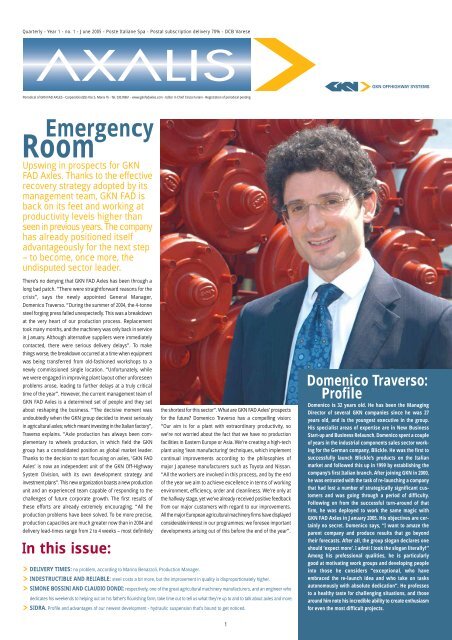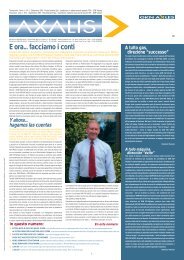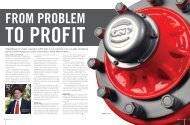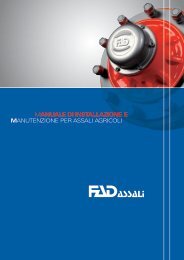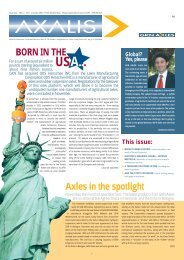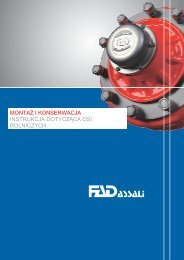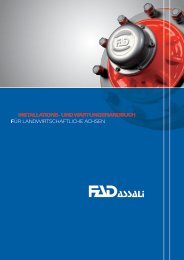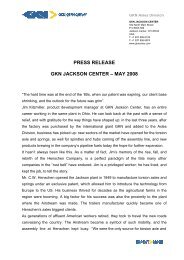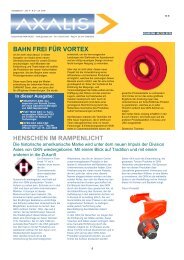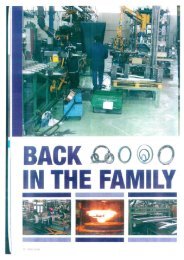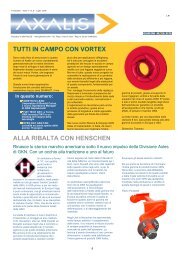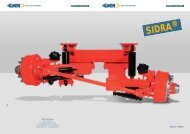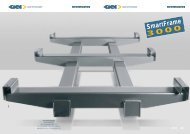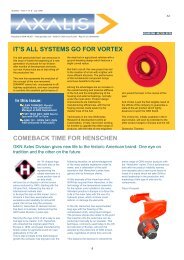Emergency - FAD assali
Emergency - FAD assali
Emergency - FAD assali
You also want an ePaper? Increase the reach of your titles
YUMPU automatically turns print PDFs into web optimized ePapers that Google loves.
Quarterly - Year 1 - no. 1 - June 2005 - Poste Italiane Spa - Postal subscription delivery 70% - DCB Varese<br />
Periodical of GKN <strong>FAD</strong> AXLES - Carpendolo (BS) V.le S. Maria 76 - Tel. 030.99861 - www.gknfadaxles.com - Editor in Chief Cinzia Furiani - Registration of periodical pending<br />
<strong>Emergency</strong><br />
Room<br />
Upswing in prospects for GKN<br />
<strong>FAD</strong> Axles. Thanks to the effective<br />
recovery strategy adopted by its<br />
management team, GKN <strong>FAD</strong> is<br />
back on its feet and working at<br />
productivity levels higher than<br />
seen in previous years. The company<br />
has already positioned itself<br />
advantageously for the next step<br />
– to become, once more, the<br />
undisputed sector leader.<br />
There’s no denying that GKN <strong>FAD</strong> Axles has been through a<br />
long bad patch. “There were straightforward reasons for the<br />
crisis”, says the newly appointed General Manager,<br />
Domenico Traverso. “During the summer of 2004, the 4-tonne<br />
steel forging press failed unexpectedly. This was a breakdown<br />
at the very heart of our production process. Replacement<br />
took many months, and the machinery was only back in service<br />
in January. Although alternative suppliers were immediately<br />
contacted, there were serious delivery delays”. To make<br />
things worse, the breakdown occurred at a time when equipment<br />
was being transferred from old-fashioned workshops to a<br />
newly commissioned single location. “Unfortunately, while<br />
we were engaged in improving plant layout other unforeseen<br />
problems arose, leading to further delays at a truly critical<br />
time of the year”. However, the current management team of<br />
GKN <strong>FAD</strong> Axles is a determined set of people and they set<br />
about reshaping the business. “The decisive moment was<br />
undoubtedly when the GKN group decided to invest seriously<br />
in agricultural axles; which meant investing in the Italian factory”,<br />
Traverso explains. “Axle production has always been complementary<br />
to wheels production, in which field the GKN<br />
group has a consolidated position as global market leader.<br />
Thanks to the decision to start focusing on axles, ‘GKN <strong>FAD</strong><br />
Axles’ is now an independent unit of the GKN Off-Highway<br />
System Division, with its own development strategy and<br />
investment plans”. This new organization boasts a new production<br />
unit and an experienced team capable of responding to the<br />
challenges of future corporate growth. The first results of<br />
these efforts are already extremely encouraging. “All the<br />
production problems have been solved. To be more precise,<br />
production capacities are much greater now than in 2004 and<br />
delivery lead-times range from 2 to 4 weeks – most definitely<br />
In this issue:<br />
DELIVERY TIMES: no problem, according to Marino Benazzoli, Production Manager.<br />
the shortest for this sector”. What are GKN <strong>FAD</strong> Axles’ prospects<br />
for the future Domenico Traverso has a compelling vision:<br />
“Our aim is for a plant with extraordinary productivity, so<br />
we’re not worried about the fact that we have no production<br />
facilities in Eastern Europe or Asia. We’re creating a high-tech<br />
plant using ‘lean manufacturing’ techniques, which implement<br />
continual improvements according to the philosophies of<br />
major Japanese manufacturers such as Toyota and Nissan.<br />
“All the workers are involved in this process, and by the end<br />
of the year we aim to achieve excellence in terms of working<br />
environment, efficiency, order and cleanliness. We’re only at<br />
the halfway stage, yet we’ve already received positive feedback<br />
from our major customers with regard to our improvements.<br />
All the major European agricultural machinery firms have displayed<br />
considerable interest in our programmes: we foresee important<br />
developments arising out of this before the end of the year”.<br />
INDESTRUCTIBLE AND RELIABLE: steel costs a bit more, but the improvement in quality is disproportionately higher.<br />
SIMONE BOSSINI AND CLAUDIO DONDI: respectively, one of the great agricultural machinery manufacturers, and an engineer who<br />
dedicates his weekends to helping out on his father’s flourishing farm, take time out to tell us what they’re up to and to talk about axles and more.<br />
SIDRA. Profile and advantages of our newest development - hydraulic suspension that’s bound to get noticed.<br />
Domenico Traverso:<br />
Profile<br />
Domenico is 32 years old. He has been the Managing<br />
Director of several GKN companies since he was 27<br />
years old, and is the youngest executive in the group.<br />
His specialist areas of expertise are in New Business<br />
Start-up and Business Relaunch. Domenico spent a couple<br />
of years in the industrial components sales sector working<br />
for the German company, Blickle. He was the first to<br />
successfully launch Blickle’s products on the Italian<br />
market and followed this up in 1999 by establishing the<br />
company’s first Italian branch. After joining GKN in 2000,<br />
he was entrusted with the task of re-launching a company<br />
that had lost a number of strategically significant customers<br />
and was going through a period of difficulty.<br />
Following on from the successful turn-around of that<br />
firm, he was deployed to work the same magic with<br />
GKN <strong>FAD</strong> Axles in January 2005. His objectives are certainly<br />
no secret. Domenico says, “I want to amaze the<br />
parent company and produce results that go beyond<br />
their forecasts. After all, the group slogan declares one<br />
should ‘expect more’. I admit I took the slogan literally!”<br />
Among his professional qualities, he is particularly<br />
good at motivating work groups and developing people<br />
into those he considers “exceptional, who have<br />
embraced the re-launch idea and who take on tasks<br />
autonomously with absolute dedication”. He professes<br />
to a healthy taste for challenging situations, and those<br />
around him note his incredible ability to create enthusiasm<br />
for even the most difficult projects.<br />
1
Commercial<br />
Outlay-more...<br />
...is less:<br />
the steel used to<br />
manufacture our hubs is undoubtedly slightly more expensive, but it provides<br />
optimised performance for agricultural machinery<br />
Sales manager Daniel Consolati tells us we shouldn’t talk of<br />
absolute “material performance ratings” without considering<br />
the exact application of a particular material. For example,<br />
it is not very objective to state that steel is better than cast<br />
iron, or vice versa. Compared to cast iron the strength of<br />
steel can be compromised by high temperatures and it is<br />
generally more elastic. However, unlike cast iron, steel<br />
won’t break when subjected to torsion and rough treatment<br />
in general. Which mean it is ideal for making agricultural<br />
hubs, a key part of an axle. “If we consider agricultural<br />
axles”, Consolati explains, “the hubs have to stand up to<br />
constant movement over rough ground (to deal with stones,<br />
ditches, holes etc.) However, these axles don’t travel great<br />
distances along roads, or at high speed – i.e. not over the<br />
standard limit of 105 km per h. So the main requisites for<br />
agricultural hubs are sturdiness and resistance. We’re not<br />
worried about the hubs’ poorer response to high temperature,<br />
as they don’t travel fast enough to get really hot. For this<br />
application the perfect material is steel”. In comparison,<br />
truck axle hubs face very different conditions. Trucks travel<br />
fairly fast and over very long distances, on roads that are<br />
generally in pretty good condition. “Truck hubs can heat up<br />
a lot during use, but they are not subject to considerable<br />
stress, so cast iron is the material of choice for this application”.<br />
Consolati’s point is that we must look at the required performance<br />
specifications for the product if we are to decide which<br />
material is most suitable for its component parts. Consolati<br />
concludes, “GKN <strong>FAD</strong> has been making agricultural machinery<br />
axles for more than 50 years. It sees steel as vitally important,<br />
despite the fact that it costs a bit more. The fact is that the<br />
higher price pays for itself because steel is indestructible<br />
and, quality-wise, makes for greater reliability”.<br />
Like diamonds, steel hubs are for ever!<br />
(Stefania Vinciguerra)<br />
Production<br />
A Question of<br />
Deadlines<br />
The tough situation in 2004<br />
is now a part of history, and<br />
delivery times are back to the<br />
standard corporate schedule<br />
- which means, very short.<br />
Marino Benazzoli, the production manager at GKN <strong>FAD</strong>, is<br />
absolutely certain of one thing. He never wants to go through<br />
a period like the last six months of 2004 ever again. “Our company’s<br />
strength has always been the capacity to produce our<br />
own hubs down to the smaller detail on our own premises.<br />
We can do so because we possess a huge 4-tonne press. For<br />
this reason our delivery times are shorter than that usually<br />
seen in the marketplace”, said Benazzoli. “However, in July<br />
2004 the press arbor broke unexpectedly. The arbor was an<br />
essential part, and it couldn’t be repaired. The only option<br />
was to cast a new one. We took six months to recover from<br />
the blow of this single part failure”. Add this to the stress of<br />
moving production equipment to new premises, and you can<br />
imagine how many sleepless nights the production team had<br />
during that six months. “After the breakdown of the press,<br />
we immediately contacted the two suppliers who provide the<br />
best quality guarantees for component manufacture, but they<br />
had longer production times: We received the first items on<br />
24 October”, Benazzoli explained. “We had stock materials<br />
we could fall back on for a short period but these soon ran<br />
out because GKN <strong>FAD</strong>’s policy is to produce to order so all<br />
customers get exactly what meets their needs. Adding on the<br />
lead-time to delivery of these third-party suppliers, we had a<br />
catastrophic situation on our hands – our deliveries were<br />
very, very late. “After a huge effort, we managed to get the<br />
press back on-line by mid-January 2005. Even in face of our<br />
huge backlog, I can proudly state that by April we had caught<br />
up with all our delayed orders and things started to return to<br />
normal”. Currently, production orders are fully processed for<br />
standard axles in two weeks, and on more complex axles in<br />
four weeks. These are the deadlines, and you can take this<br />
manager’s word that they’ll be met.<br />
Under the<br />
Parent’s Wing<br />
Being part<br />
of a multinational company<br />
means sharing its values<br />
GKN <strong>FAD</strong> is part of a multi-national group. On a 1-100<br />
scale, how important is this fact Answer: 101. The aim of<br />
a successful multi-national is that the sum of the whole<br />
is greater than the sum of its parts. GKN <strong>FAD</strong> therefore<br />
benefits from the overall vision and values of the multinational<br />
GKN Plc. GKN plc activities provide its shareholders<br />
with interesting openings for investment based<br />
on solid business activities, with a long-termist policy<br />
that will not change overnight. Furthermore, GKN believes<br />
that its people are the real assets – and there are a<br />
lot of them! Although there are more than 35,000 in more<br />
than 30 countries around the world, it doesn’t mean they<br />
are not recognised as individuals. It is the people of GKN<br />
that define they way the company operates and the way<br />
it is perceived in the marketplace. For this reason the<br />
company has a strong policy to invest in people. This<br />
policy requires selection and deployment of personnel<br />
who have vision and aptitude, rather than selecting people<br />
for a role based on their previous experience. GKN<br />
plc comes out firmly against all types of discrimination,<br />
and considers what each individual can offer the business<br />
units they work for. The basic idea is that it is people<br />
who really make an ordinary business into a winner.<br />
Domenico Traverso<br />
2
Interview with<br />
Simone Bossini<br />
Since the early years of the last century, the Bossini family<br />
has supplied the agricultural transport sector. Their base is<br />
Carpenedolo, a small town in the eastern flatlands 26 km<br />
from Brescia (and just next door to GKN <strong>FAD</strong> as chance<br />
would have it!). They have pictures to prove their family history;<br />
old photographs on the office walls clearly illustrate the<br />
company’s activities and portray the forebears of today’s<br />
state-of-the-art tanker trucks. Simone Bossini, 26, belongs<br />
to the latest generation of constructors. He is evidently<br />
proud of his company’s leading performance in Italy, and in<br />
the following interview answers a few questions about his<br />
corporate and personal life.<br />
How did your company start up<br />
Probably the man responsible for it all was my great grandfather,<br />
who was a carpenter. It was he who handed a passion<br />
for building things down to my grandfather, Pietro. And<br />
it was grandpa Pietro who started building agricultural trailers.<br />
He built wooden horsedrawn carts. Steel and motors<br />
were practically science fiction at that time!<br />
Your company has always been a family affair. Who runs it<br />
At the moment there are three of us, with the work divided<br />
up equally between us. My father, Quirino, looks after customer<br />
relations. My uncle, Rodolfo, looks after the accounts,<br />
and I’m in charge of production. Which means I lead a staff<br />
of 25 people. However, we can all step in and take over each<br />
other’s jobs whenever necessary. I’m not the youngest<br />
Bossini, there are two other boys. My brother Stefano is 16,<br />
as is my cousin Andrea. But they’re still at school, so we’ll<br />
have to wait.<br />
What does the company do that you are most proud of<br />
We specialise in large farm trailer equipment, and in particular,<br />
tanker trucks for sewage sludge. All our many products<br />
include patented technology, such as the hydraulic suspension<br />
systems to prevent problems such as rolling and sliding,<br />
the rotary dung spreader, and sewage sludge land-filling<br />
equipment.<br />
As a manufacturer, what do you look for in an axle<br />
That’s easy. First a good price to quality ratio. But we also<br />
ask the axle manufacturer to provide us with assistance and<br />
we look for their ability to match their production according<br />
to our needs. Our requirements for axles develop according<br />
to the evolution of the machinery market.<br />
Am I right in thinking that Bossini and GKN <strong>FAD</strong> work in<br />
very close collaboration<br />
Oh, yes! And it’s not a recent development. In the past we’ve<br />
had visions for new products that were not to be found anywhere<br />
in the market, and GKN <strong>FAD</strong> made them for us. One<br />
example is the axle with a ribbed steel hub. It was generally<br />
assumed that although ribs were absolutely necessary for<br />
cast iron hubs, there was no benefit for them on steel hubs.<br />
We thought, why not improve the design of steel hubs by<br />
adding ribs This was our line of thinking – and it wasn’t just<br />
a pipe dream. GKN <strong>FAD</strong> now produces axles with ribbed<br />
steel hubs.<br />
Interview with<br />
Claudio Dondi<br />
Lomellina is an area occupied by small and medium size<br />
farmsteads, run by families with a great love of the traditional<br />
methods that even the arrival of the most advanced technologies<br />
has done little to dispel. This is certainly the impression<br />
you get listening to 29-year-old engineer Claudio Dondi.<br />
Claudio generally doesn’t wear a shirt and tie unless he can<br />
possibly help it, but definitely not at the weekends where he<br />
can be spotted riding a tractor at his father Antonio’s farm<br />
‘Cascina Uccellina di Tromello’ (near Vigevano).<br />
Mr Dondi, how long has your family owned<br />
Cascina Uccellina What does the farm produce<br />
Uccellina has been in my family’s ownership since the beginning<br />
of the 20th century. My great grandfather grew hay and<br />
raised cattle. Today, the livestock part has gone and the fields<br />
are given over to rotation crops: rice, maize, wheat, sunflowers<br />
and peas. We use traditional methods and our produce is<br />
certified as being organic.<br />
Can you tell us about recent developments within the agricultural<br />
produce market Can the focus on quality keep<br />
domestic products ahead of oriental competitors<br />
Farming methods have changed dramatically over the last<br />
few years. Toward the end of the 1970’s people did everything<br />
they could to maximize yields using chemical fertilizers,<br />
hybrid seeds and weed killers. Now the focus is on healthy,<br />
organic farming. The produce sector is currently severely<br />
threatened by the influx of Asian produce, at costs that are<br />
very much lower than ours. The only thing we can do is invest<br />
in quality and hope institutional measures will soon be taken.<br />
Up to a few years ago, pig farming accounted for a great deal<br />
of your turnover. Now the pigsties are empty. What happened<br />
The livestock market is not so very different from the cereals<br />
market. The livestock market had a saturated supply and the<br />
price cuts induced by competition meant that those who<br />
couldn’t cut their costs would gradually leave the marketplace.<br />
What are the selection criteria a farm such as yours adopts<br />
when considering tractors and other agricultural machinery<br />
Is axle quality a significant variable<br />
The cost of a tractor is depreciated over two or more seasons.<br />
A vehicle breakdown can lead to harvesting delays and hence<br />
considerable economic losses so key considerations when<br />
purchasing are reliability, availability of spare parts, and the<br />
average time to repair – which must be as short as possible.<br />
There are few brands that are strong on all three criteria.<br />
Axle quality and sturdiness are the key consideration for<br />
most applications: tractors and other equipment are often<br />
subjected to tough environmental conditions –e.g. the water<br />
of rice-fields or corrosion caused by chemical agents in fertilizers.<br />
How do you handle your double role as engineer and farmer<br />
If in 20 years’ time your children say they want to follow in<br />
the footsteps of the various generations of your family, what<br />
will you advise<br />
Working in the office and working on the farm are so different,<br />
but I’d say they are complementary. In an office it’s hard<br />
to get that immediate satisfaction you get with farm work. On<br />
the other hand, considerations of economic remuneration<br />
tend to lead youngsters into professional jobs. It’s not easy to<br />
see where the job market will be in twenty years’ time, but if<br />
my children were to say they wanted to follow in the farming<br />
footsteps of my family I would be pleased to help them, if for<br />
no other reason than that the countryside guarantees a high<br />
quality of life.
A few dates<br />
A little story<br />
1950s: <strong>FAD</strong> (Fabbrica Assali e Dischi) is founded<br />
1986: Geplasmetal (founded in the 1950s) is purchased,<br />
for distribution of <strong>FAD</strong> products; an assembly department<br />
is set up within it for agricultural and industrial axles.<br />
1988: <strong>FAD</strong> (which in the meantime, has become a market<br />
leader) purchases GSM (founded in the 1950s and<br />
specialised in the production of elastic axles, trailer<br />
drawbars and industrial brake systems)<br />
End of 1980s: <strong>FAD</strong> UK is founded, for distribution<br />
in the British and Irish market.<br />
1990: Salati is purchased.<br />
1997: 37% GKN partnership.<br />
2000: GKN Plc buys out <strong>FAD</strong>.<br />
Let’s celebrate: a Sidra is Born!<br />
With the advent of industrialization after World War II, the once abundant supply of manpower in the provinces began to<br />
decline. New factories were opening up around the cities, and there was a move away from rural areas. <strong>FAD</strong> (Fabbrica Assali<br />
e Dischi) was founded in the mid-1950s during a period of reconstruction and the start of mechanization. <strong>FAD</strong> concentrated on<br />
a mainly local and regional market, and was family owned. In the following years, operating in a free market and supported by<br />
government incentives, the company soon broadened in scope and looked toward foreign markets. This was a shrewd decision<br />
and it brought excellent results. The product exceeded customer expectations, and the <strong>FAD</strong> brand grew to be synonymous with<br />
quality enabling rapidly growing distribution of the product internationally. The next few years had their ups and downs, due<br />
to the general economic situation and the instability brought about by the oil crisis in the 1970s which led to recession. <strong>FAD</strong><br />
survived those tough times to continue to operate successfully today, its secret lying in a rigorous production programme<br />
based on product control and rationalization of manufacturing processes. The competitiveness of the company has been a<br />
constant throughout its history. This is the result of a strong policy to sustain product quality, prices and delivery deadlines,<br />
paving the way for new exporting opportunities and ongoing corporate expansion.<br />
Cinzia Furiani<br />
Focus<br />
The latest addition to GKN <strong>FAD</strong> Axles’ range of products, produced in collaboration with DBD, is Sidra.<br />
Sidra will be officially unveiled in June, during the international EIMA farm machinery show (17, 18, 19 June).<br />
The ceremony is to be held at “Azienda agricola Palazzi Diamantina” in Vigarano Mainarda, in the<br />
province of Ferrara. Sidra is designed to handle loads ranging from 9,000 to 12,000 kg. It features an<br />
independent hydraulic suspension system including steering and fixed axle shafts, all with EEC standard<br />
certified brakes. Its Unique Selling Point Sliding and pitching cannot occur. Sliding is avoided thanks to the independent wheels and hydraulic systems, and pitching is avoided because<br />
the hydraulic oil cannot be compressed due to the use of nitrogen accumulators. The self-bearing module making up Sidra is equipped with nitrogen accumulators, making for maximum<br />
comfort both at low speeds (for excellent shock absorption when travelling over large obstacles) and at high speeds (oscillation buffered and absorbed). We should note that the nitrogen<br />
accumulators, pre-set for differentiated action, are equally effective when fully loaded and unloaded. For dumpers positioned to the rear, the module may include cutoff valves, for stopping<br />
and for rigidity. Each module can be equipped with hydraulic cylinders for power steering.<br />
FFFFFLASH<br />
The International Leadership Development Programme was<br />
developed by GKN plc to provide comprehensive career training<br />
for young graduates, with the view to developing the next generation<br />
of leaders and managers of the group. GKN supports<br />
trainees as they embark on their careers and provides opportunities<br />
and guidance until they reach positions of responsibility. The<br />
programme generally lasts for two years. It is open to all appropriate<br />
degree-holders and graduates who submit an application.<br />
Before a trainee joins one of the group companies, he or she has<br />
to pass a number of tests and is approved only after preliminary<br />
interviews. The twenty trainees selected each year have a<br />
chance to work on various projects in GKN offices around the<br />
world. This is a highly significant opportunity since it means experiencing<br />
a range of projects, roles, and cultures. Trainees travel<br />
widely, but they are constantly supported up by a mentor and a<br />
development manager. The programme brought Caroline Westall<br />
to GKN <strong>FAD</strong> Axles in May. For six months, Caroline will work in<br />
conjuction with the Purchasing Department and focus on material<br />
cost reductions, with the view to rationalizing the supply chain.<br />
E for Environment<br />
In 2004, GKN <strong>FAD</strong> received ISO 14001 certification, demonstrating<br />
its commitment to protecting the environment.<br />
Among the measures it has taken to reduce its environmental<br />
impact are the strict control of gas emissions and other pollutants,<br />
as well as the improvement of waste recycling. This<br />
is a goal GKN <strong>FAD</strong> was particularly keen on, and our efforts<br />
received official recognition from the Minister of<br />
Environment and Territorial Protection, Altero Matteoli, last<br />
October. <strong>FAD</strong> will continue to make improvements during<br />
2005, to obtain OHSAS 18001 certification for occupational<br />
safety guarantees.<br />
Bits’n’Pieces<br />
With dynamic free competition such as that experienced in<br />
the European marketplace, managers and marketing representatives<br />
always felt constrained by the stringent policies<br />
against comparative advertising. If a manufacturer’s products<br />
can be shown to provide objective and measurable<br />
advantages in quality, price or performance compared to the<br />
competition, why shouldn’t manufacturers be able to say so<br />
on TV or in the press After a fifteen-year struggle in Italy,<br />
Legislative Decree 67/2000 at last recognised that this kind of<br />
advertising is legitimate, and indeed that it is a vital instrument<br />
to improve the dissemination of information to customers<br />
and to promote competition between companies.<br />
GKN Fad<br />
21 = million euros turnover in 2004<br />
100 = employees<br />
50 = countries covered by distribution<br />
Let’s talk number...<br />
1994 = year in which ISO 9001 certification was obtained<br />
647 = customers<br />
8,600 = sq. m. area occupied by the production department<br />
70,000 = axles sold in 2004<br />
160,000 = axle shafts sold in 2004<br />
Ethics and Corporate Communication<br />
Closing the Gap.<br />
Italian and European legislation – and, above all, managerial<br />
ethics – place strict limits on the use of such methods of<br />
communication. This kind of advertising must be fair and neither<br />
be deceitful nor disparaging to others competitors.<br />
Corporate executives or entrepreneurs who authorise unfair<br />
competition using negative advertising lose their commercial<br />
campaign from the very outset: only those who have little to<br />
say in favour of their own products can content themselves<br />
with disparaging the products of others.<br />
Alessandro Bolla<br />
content and communication manager, partner Soluzioni s.r.l<br />
4


